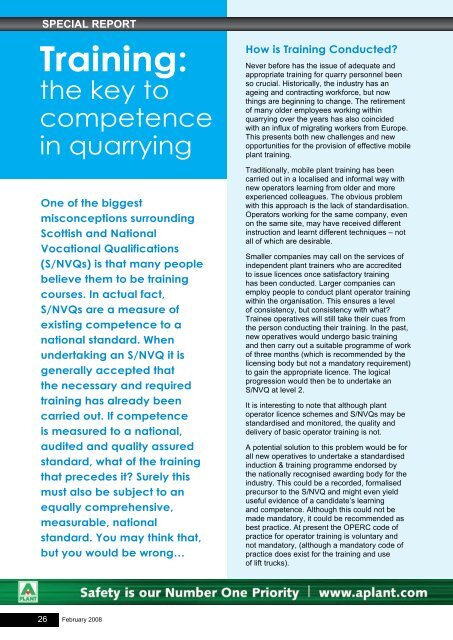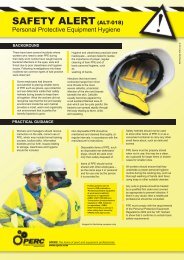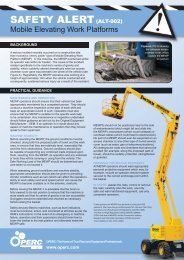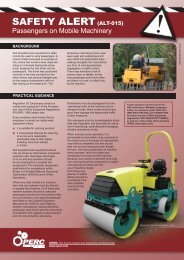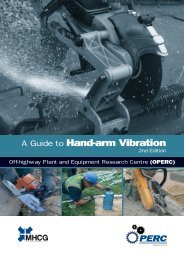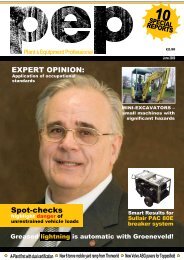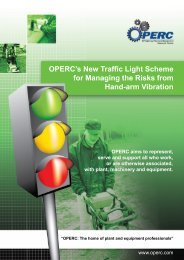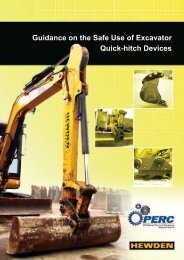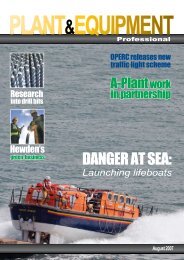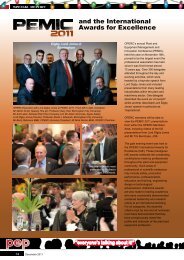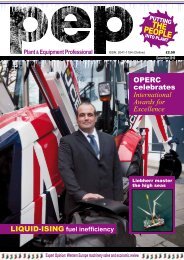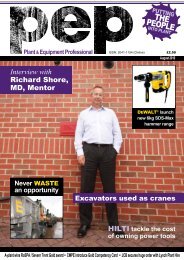Plant&Equipment
Download pdf - OPERC
Download pdf - OPERC
- No tags were found...
Create successful ePaper yourself
Turn your PDF publications into a flip-book with our unique Google optimized e-Paper software.
Special report<br />
Training:<br />
the key to<br />
competence<br />
in quarrying<br />
One of the biggest<br />
misconceptions surrounding<br />
Scottish and National<br />
Vocational Qualifications<br />
(S/NVQs) is that many people<br />
believe them to be training<br />
courses. In actual fact,<br />
S/NVQs are a measure of<br />
existing competence to a<br />
national standard. When<br />
undertaking an S/NVQ it is<br />
generally accepted that<br />
the necessary and required<br />
training has already been<br />
carried out. If competence<br />
is measured to a national,<br />
audited and quality assured<br />
standard, what of the training<br />
that precedes it? Surely this<br />
must also be subject to an<br />
equally comprehensive,<br />
measurable, national<br />
standard. You may think that,<br />
but you would be wrong…<br />
How is Training Conducted?<br />
Never before has the issue of adequate and<br />
appropriate training for quarry personnel been<br />
so crucial. Historically, the industry has an<br />
ageing and contracting workforce, but now<br />
things are beginning to change. The retirement<br />
of many older employees working within<br />
quarrying over the years has also coincided<br />
with an influx of migrating workers from Europe.<br />
This presents both new challenges and new<br />
opportunities for the provision of effective mobile<br />
plant training.<br />
Traditionally, mobile plant training has been<br />
carried out in a localised and informal way with<br />
new operators learning from older and more<br />
experienced colleagues. The obvious problem<br />
with this approach is the lack of standardisation.<br />
Operators working for the same company, even<br />
on the same site, may have received different<br />
instruction and learnt different techniques – not<br />
all of which are desirable.<br />
Smaller companies may call on the services of<br />
independent plant trainers who are accredited<br />
to issue licences once satisfactory training<br />
has been conducted. Larger companies can<br />
employ people to conduct plant operator training<br />
within the organisation. This ensures a level<br />
of consistency, but consistency with what?<br />
Trainee operatives will still take their cues from<br />
the person conducting their training. In the past,<br />
new operatives would undergo basic training<br />
and then carry out a suitable programme of work<br />
of three months (which is recommended by the<br />
licensing body but not a mandatory requirement)<br />
to gain the appropriate licence. The logical<br />
progression would then be to undertake an<br />
S/NVQ at level 2.<br />
It is interesting to note that although plant<br />
operator licence schemes and S/NVQs may be<br />
standardised and monitored, the quality and<br />
delivery of basic operator training is not.<br />
A potential solution to this problem would be for<br />
all new operatives to undertake a standardised<br />
induction & training programme endorsed by<br />
the nationally recognised awarding body for the<br />
industry. This could be a recorded, formalised<br />
precursor to the S/NVQ and might even yield<br />
useful evidence of a candidate’s learning<br />
and competence. Although this could not be<br />
made mandatory, it could be recommended as<br />
best practice. At present the OPERC code of<br />
practice for operator training is voluntary and<br />
not mandatory, (although a mandatory code of<br />
practice does exist for the training and use<br />
of lift trucks).<br />
26<br />
February 2008


